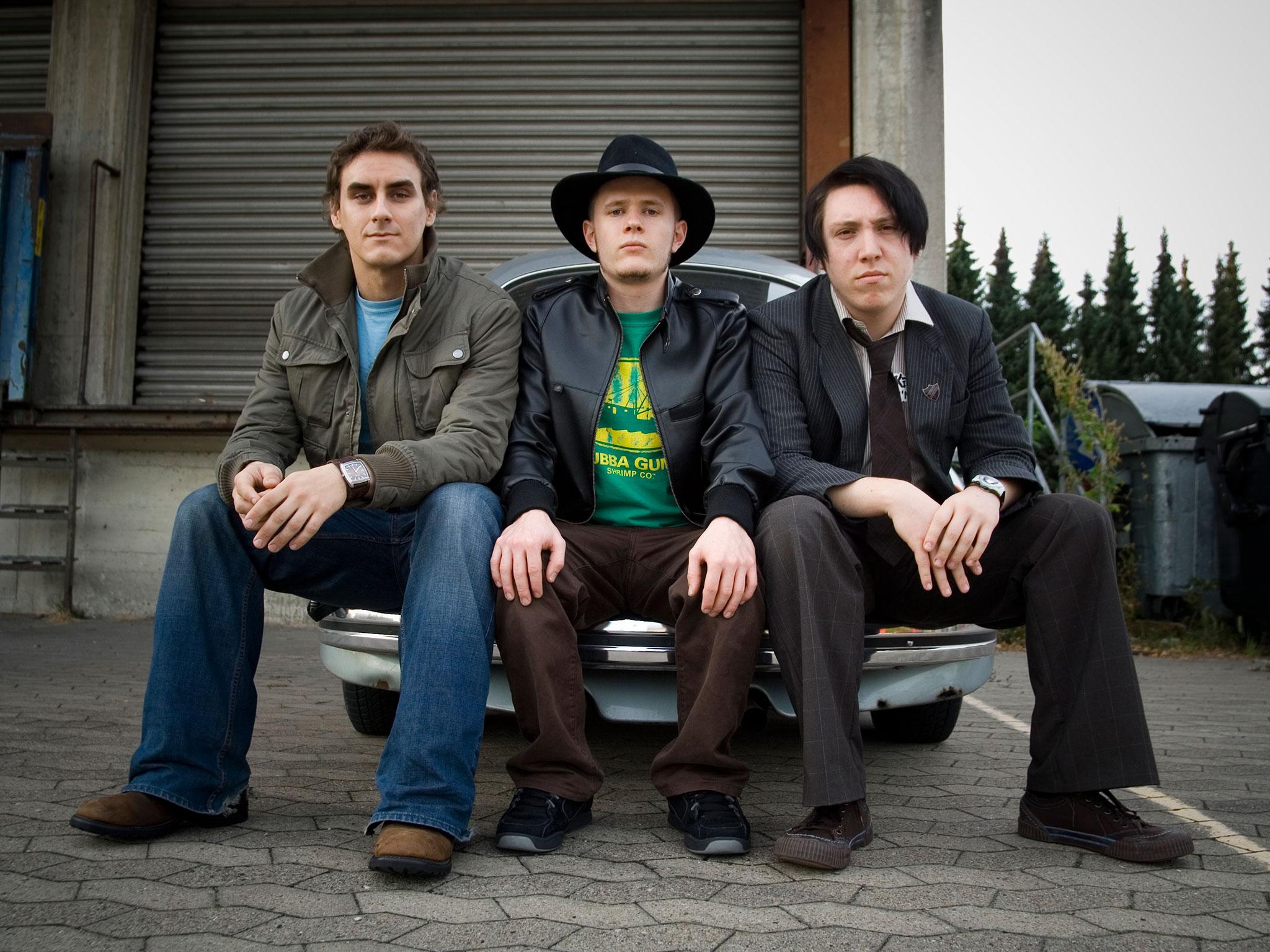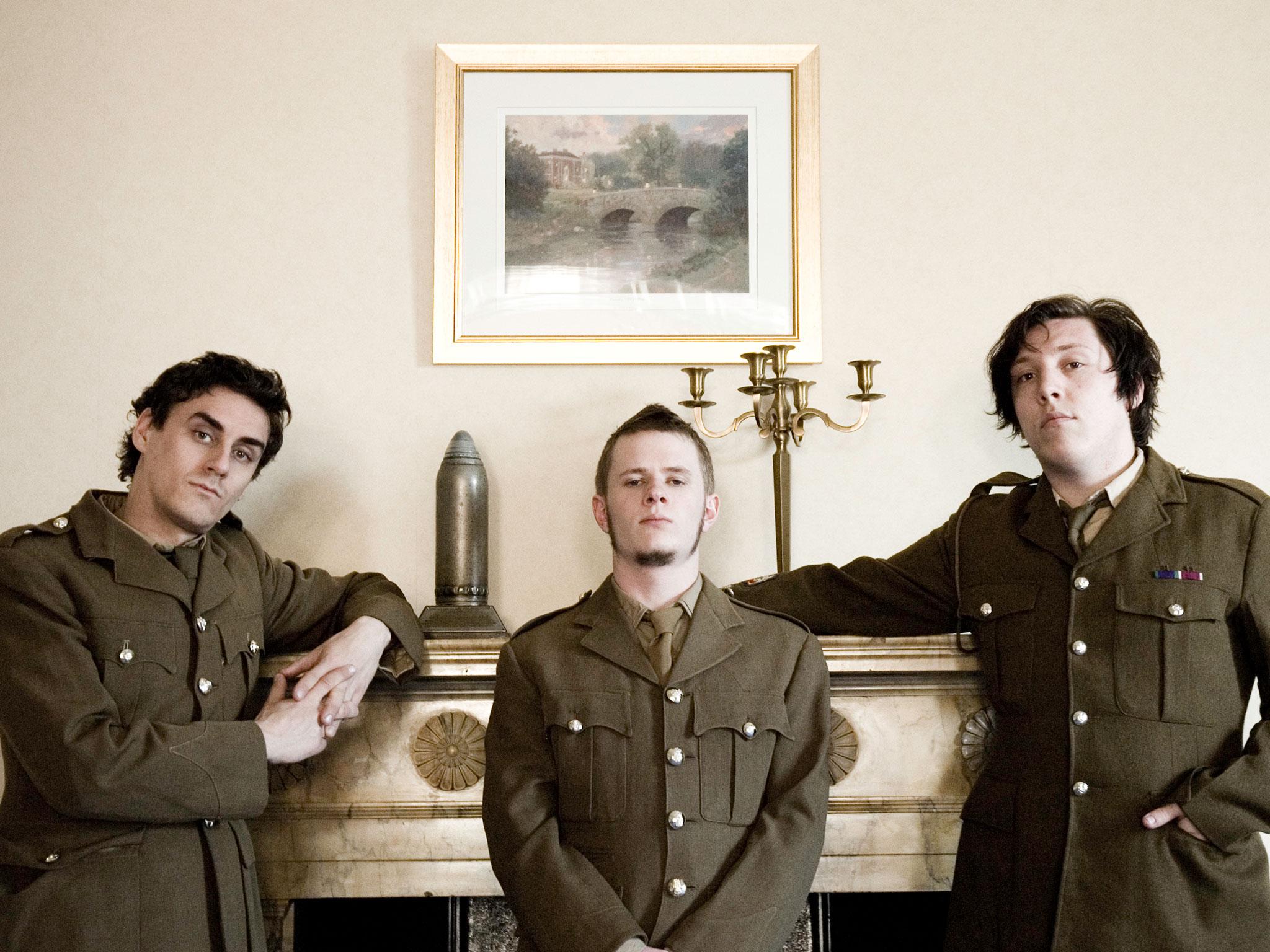Jamie Lenman interview: 'Somehow I knew that In Nothing We Trust was probably going to be our last record'
'In Nothing We Trust', the third and final album from sorely missed Surrey trio Reuben has been given the re-issue treatment by Big Scary Monsters for its 10th anniversary. We spoke to ex-Reuben frontman Jamie Lenman to try and delve deeper into this underappreciated lost classic

“I put a lot of pressure on myself to write a record that I felt had some sort of worth attached to it as opposed to just going into a studio and recording a bunch of pop songs; I'm not saying there’s nothing of value in that but it’s not as interesting as trying to capture a piece of someone's f**king soul and that's always what I try and deliver. You could say that In Nothing We Trust was the first time I'd been successful at delivering that.”
Jamie Lenman is very clear which of the three albums made during his tenure leading one of the most under-rated rock bands in recent British music history is his favourite.
Many will point to the intense naïve burst of youthful energy that make up the 16 songs on Reuben’s debut album Racecar is Racecar Backwards as the band’s ultimate work. (Too long and a slightly juvenile quality are Lenman’s hang-ups over his band’s debut today). Or maybe the big rock solid production of Very Fast, Very Dangerous is more your bag (it isn’t Lenman’s, who describes the album as too clean for his tastes).
But In Nothing We Trust always felt like the beginning of Reuben’s ascent into true greatness, the sort of album that cemented a band’s legacy, and ensured they wouldn’t be remembered for never managing to follow up an impressive, promising debut. After years of graft working 9-5 jobs and using all their holiday to sweat their cojones off on tour, it looked as if things were finally about to pay off for Reuben.
Less than a year after the release of In Nothing We Trust, Reuben announced they were going on indefinite hiatus.
For a band known by few but adored by those few, it was a shock; Reuben had just released a career defining record that seemed full of promise in regards to the band’s future prospects. “It’s the record I had always wanted to make” says Lenman as we catch up in the glorious Cotswold sunshine that bathes 2000Trees Festival, a week prior to the album’s re-release. “It did all the things that I was always trying to do in every area. I was always after that clanky, live sounding, rough-around-the-edges production, I always wanted you to hear the bad takes and when my voice was cracking or when we just weren’t playing well. By that point, we were better as musicians but still not very good. We were definitely better than the band that made the previous two albums and so we were able to do a lot more complex stuff but we were right on the edge of our capabilities as musicians.”
That ‘rough-around-the-edges’ production was down to the performances just as much as it was down to any sort of technical studio wizardry. Lenman was pushing the songs to their limit in terms of complexity and turn-on-a-dime time signatures, which led to squabbles in the album’s writing sessions. But he was determined to capture the raw intensity of a rock band playing with such ferocity that they appeared always on the brink of collapse. “I like it when you hear a record and you don't know if the band are going to make it to the end of the track because they're giving it so much energy and you’re playing such complex stuff” he says. “That's what Ross Robinson does so well and I’d always wanted to work with him for those reasons. I know that At the Drive-In don't like Relationship of Command and they might be the only five people on the planet that don't! But for me, that record still sounds so combustible; there are so many areas of wild abandon and chaos.”
In Nothing We Trust had a troubling gestation period; tensions within the band were strained coming off the back of a gruelling touring schedule for Very Fast, Very Dangerous and some of those dramas spilled over into writing sessions.
“We weren't communicating very well as a band or as people and I found it incredibly hard to write songs in that environment. We were pushing ourselves as musicians; I was writing all this crazy bullshit in 11/8 or whatever crazy time signature it was and there was a lot of to-ing and fro-ing about whether I was making the songs complex for the sake of it, which I don't believe I was. But my love for the complex side of things made the writing and learning process very difficult.”
Recording itself commenced in December 2006 and was less painful than the band had maybe anticipated, with a sense of harmony (mostly) pervading over the sessions. “I think there may have been a bit more pressure on us because deep down, somehow I knew that there was a good chance it was probably going to be our last record, which made the stakes so much higher. In fact we almost split up before we recorded it; we had a huge blow out when we were rehearsing and I thought that might be the end of it. But I wanted more than anything to get the record out, so I rolled up my sleeves, rounded up the boys and we dived right back in there. Really that third album saved the band … for about a year.”
Despite being Lenman’s favourite Reuben album, his memories of making it are filled with mixed emotions; he achieved something magnificent with the new-found maturity and intricacy inherent throughout the album, but the band’s constant status as underdogs was slowly beginning to split the three-piece at the seams. “I felt like I was coming to the end of my life” says Lenman of that time. “It sounds so dramatic to say that now but we'd been touring for about six years by that point, almost non-stop and with very little support.
"We wouldn't get things like Reading Festival and that really broke my heart a little bit because growing up as a kid at that time, if you're in a band then you want to play Reading Festival. We would play sold out shows to a couple of thousand people and for no reason that I could see, they just wouldn't let us into their little club; we could never quite break through that glass ceiling and I just felt like I'd worn myself out trying.”
“There's a horrible interview on the DVD” he continues, referring to the 2007 self-released documentary Whatever Happens in Aldershot, Stays in Aldershot, “someone asked, 'Where do you see yourself in five years’ time?' And I said that I didn't know if I was going to be alive in five years’ time. Not because I was going to kill myself or anything nearly that dramatic but I just couldn't see a future, I felt like my life was over. I went through what I now recognise as one of several bouts of self-loathing; I really felt my youth petering away even though I was only f**king 24, I felt like a really old man.”

It should be noted that through-out the majority of the dialogue above, Lenman is laughing, seemingly baffled by the melodramatic disposition that took over his mid-twenties. He’s much happier as a mid-thirty-something, confessing that a large portion of his 20s ‘was a f**king s**tty time emotionally’, but any turmoil in Lenman’s private life was often masked in public with a jovial demeanour and a goofy sense of humour. Sometimes however, it was felt in camp Reuben that the humour detracted from the sincere and genuine music the band made. “I don’t think we helped ourselves on the first two records with all the comedy videos and moustaches and what-not” says Lenman “but we did have a big sense of humour which was something that really held us together through everything that we went through. So it was important to the band but as a result, I don’t think people took us too seriously. That seemed to change a little with the release of the third album and I think it helped people to put the first two into context as well. You don't get a feel for the band as a whole if you just listen to the first two; I think you really need In Nothing We Trust as that last piece of the puzzle before you can understand what Reuben was about. You need three records to really have a relationship with a band and more often than not, bands go off the boil on album no.4.”
When I ask for examples, the humour comes back in to play. “I'm not pointing any fingers apart from at f**king everyone! There are very few bands that I can think of that haven't faltered after record three, apart from maybe The Beatles and Madness. I just think that the energy that holds the kinds of bands that I’m into together is about youth, a special moment which by definition can’t last long. To be frank, it's very difficult to stretch that energy to even three albums. I think much beyond that point you’re really pushing it.”

Lenman turned to inspiration from his peers when writing the bulk of In Nothing We Trust; he points to two British rock records in particular, both released in the preceding 2-3 years that shaped the songs forming in his head. “From a musical standpoint, Biffy Clyro’s Infinity Land had a strong effect on the material. We'd always been friends with Biffy but I'd never really got them until we went on tour with them and then I just fell in love with Infinity Land. They were playing those songs every night and it was the record that I was breathing in at the time of writing.
"Then lyrically I had really got into the way Frank (Turner) writes in Million Dead. They’d always remained a little opaque to me but then I got into them on Harmony No Harmony and soon after became friends with Frank. His lyrics are so clever; I remember sitting down with him in a venue in Exeter and asking him what they were about. He became like an over-enthusiastic university lecturer and shared all these concepts and ideas with me, it was a real education. I learnt an awful lot about wider historical themes, whereas before I'd only really written songs about my own feelings or girlfriends; a lot of the material on the first two records is mined from those two central motifs. The broader themes on Harmony No Harmony and the musicianship on Infinity Land came together and were a huge influence.”
Looking outside of himself rather than internally for inspiration inspired the album’s opening song and one of the moments Lenman points to as his proudest in Reuben. It was ‘Carthago Est Delenda’ from Harmony No Harmony that provoked a change, a song that chronicles Turner’s detachment from the city by drawing parallels between his own experiences and those of St Augustine, a theologian and philosopher who chronicled his arrival to the city, descent into hedonism and final redemption through Christianity in his book ‘The City of God.’ Lenman’s response to this was ‘Cities on Fire’, a song that talks of burning down London Town and starting all over again, themes that had not even been hinted at on Racecar is Racecar Backwards or Very Fast, Very Dangerous. “I'd never written a song like ‘Cities on Fire’ before, I was very proud to have written something about broader themes, about history and whatnot, taking from what Frank had done on Harmony No Harmony. We always used to start our records with a bang but that one has got this ponderous minute long guitar intro and I had to persuade the others that we should take our time but I’m glad we opened it like that.”
Another song Lenman sites as a personal triumph is the album’s idiosyncratic, multi-layered closing track ‘A Short History of Nearly Everything’. “That had taken me years to write” he says, “I would assemble a section at a time and put it together gradually; it was a huge mountain to climb and I finished it just as we went in to record. I think that might be the best song I've written, it's either that or ‘I Ain't Your Boy’. I still love that song, I listen to the record every now and then and I like all of it but I’m particularly proud of ‘A Short History of Nearly Everything.’”
News of the re-release has stoked reunion rumour’s fire but Lenman is very clear that those crying out for a Reuben 2.0 will be waiting a very long time. “It's funny the way people treat Reuben as this legendary band now; we’re spoken about in hushed tones but when I was in Reuben, those same people would sneer at us. We’d turn up somewhere and people would be like, ‘Oh for f**k’s sake, it’s Reuben!’ we didn’t feel welcome anywhere. We were mostly on bills where we were either too aggressive or too melodic. Soundgarden once said that they were too punk for the metal kids and too metal for the punk kids and that’s exactly how we felt.”
But given that the love for his old band seems stronger now than it ever was whilst they were an active recording and touring triage, does he see any value in re-visiting Reuben? “I know there is a huge fan base there but even if I did want to do it, which I don't, there's no indication that it would be a runaway success. Sure it's easy to press like on an internet post but it's tougher to put your money where your mouth is and travel down to a show.
"If we reformed, we’d be marginally successful for one tour and maybe one album and then everyone would be disappointed because we weren't as good as they remembered us being, they'd be disappointed that the new album doesn't sound exactly like Racecar is Racecar Backwards and then it would fall off like every pathetic band reunion. It's not like I haven't spent the last 9 years contemplating this you know! Every band that's come back from a protracted absence, it's exciting for about a minute, but then the realisation sets in that they’re not as good as they used to be and I just don't want to f**king be a part of that.”
In Nothing We Trust is available on vinyl and digitally through Big Scary Monsters now
Join our commenting forum
Join thought-provoking conversations, follow other Independent readers and see their replies
Comments
Bookmark popover
Removed from bookmarks